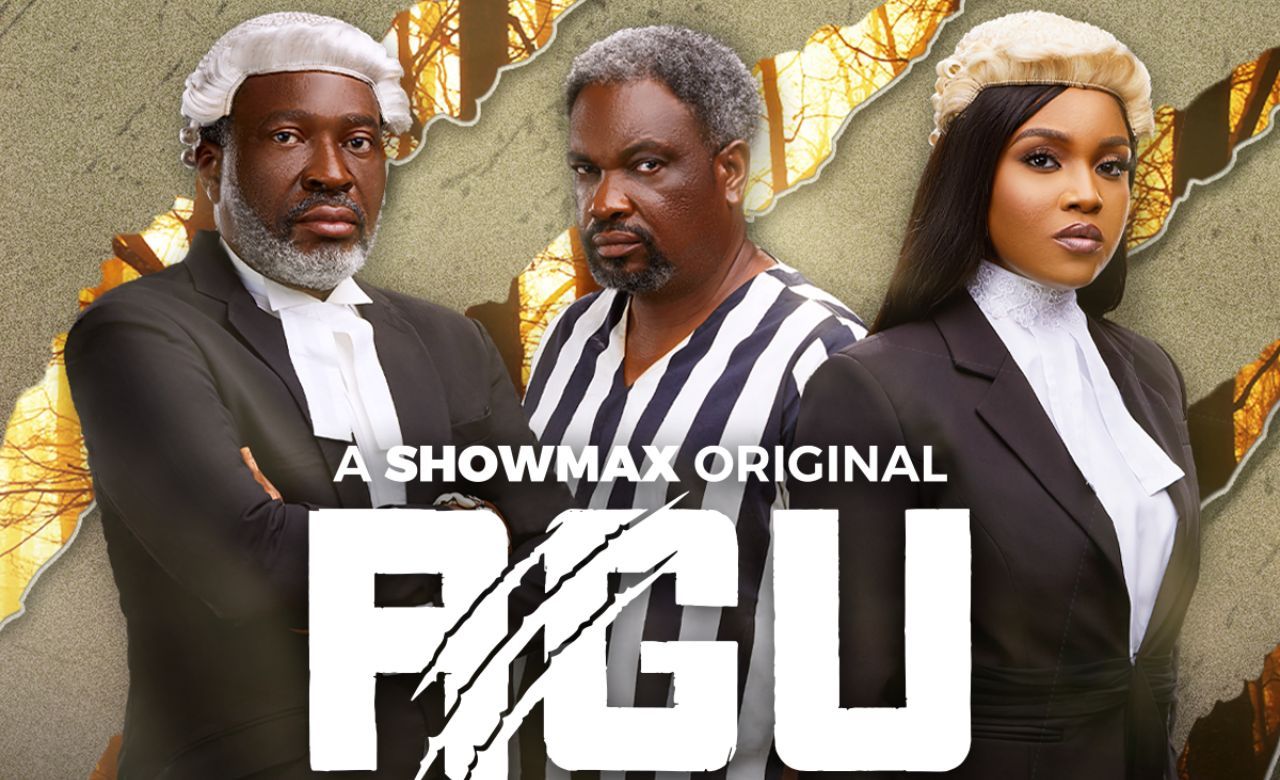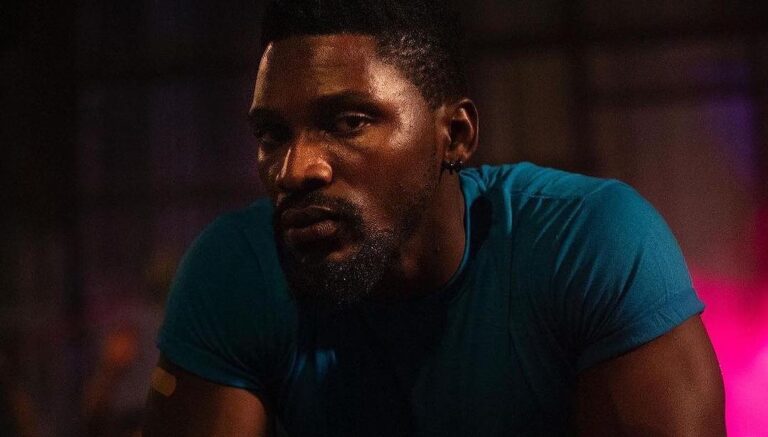One would be forgiven if they concluded that Slum King was a Gangs of Lagos spinoff. It is a good comparison. Gangs of Lagos carries its weight, and if read a certain way, it might even be called a great Lagos film. The comparison doesn’t end in narrative similarities; the feel, the slow-mos, the neverending battle for territories and defending said territories. These are all staples that align both films. (We can, merely for acknowledgment purposes, summon Shanty Town as a possible, far-off influence, but it isn’t as good as Gangs of Lagos.) However, the comparisons end here. Qualitatively, Slum King pales beside Gangs of Lagos.

Created by Eric Agimiehn and Chichi Nworah (Shanty Town) and directed by Dimeji Ajibola (Shanty Town), Slum King’s inadequacy is odd because it is a ten-part series with more room than Gang of Lagos to set up its crime mechanics and network of characters. But the series floundered desperately.
Spoilers Ahead
Edafe (Adeoluwa Akintoba) witnesses the tragic murder of his family as a boy, and it damages him permanently. Sent to live with his grandmother, she also dies fatally at the hands of a boy, Dare (Imanah Samson), under the orders of Tequila (Mide Glover) in Oro Lede. In anger, Edafe murders the boy and is imprisoned. Fifteen years later, Edafe (Tobi Bakre) returns to the community with Imole (Olarotimi Fakunle), the Alaiberu slum king, who will now harness criminal order in a broken community and oversee negotiations with the notorious Agbakara gang faction.
The first problem that crawls at the viewer is how slow-paced Slum King is. Multiple factors contribute to this. Various scenes could have been merged to serve one purpose. The actors go on this roundabout journey where they speak proverbs or slang and then proceed to translate in successive lines. This does not factor in how slow some deliveries are, even in some scenes that don’t need slow deliveries. And as the series unfolds, you realise the cardinal scene rule of coming in late and leaving early is disregarded.
It is incredible that for a show that lacks deft pacing, many core emotional events happen so close to one another, sometimes even simultaneously. The absence of breathing room to process the emotional severity of these moments prevents the viewer from properly connecting to or respecting their consequences. There is not much room to address all tragedies and core moments separately, but a series this poorly paced cannot blame time. It had ten episodes. In fact, it may have had too much time on its hands.
The poor pacing and handling of emotional exposition affect the performances. Tobi Bakre’s performance in Gangs of Lagos might have been his template for Slum King. Each scene runs its course with what one might imagine as a replica of a similar scene in the former film. He flounders from one major and completely different emotional scene to another. Say, from a scene where he connects with his love interest and the next, he is challenging the trauma of his family’s death. Even for a strong actor, this is a difficult demand. What it does to Tobi Bakre is trap him in a monotonous performance. And this spread across the series.
The acting across the board, while passable, does not leave any memorable mark. There is no standout performance. Even Olarotimi Fakunle, who performed well in Gangs of Lagos, has a weak outing here. The young actors try, but not enough to redeem the series. The overall acting is melodramatic, with the actors making the wrong choices in multiple scenes. It feels as though, at some point, the actors realise they are floundering in a generally incoherent story, and they give it the equivalent performance.
‘ Agu’ Review: Kanayo O. Kanayo Struts in Showmax Legal Drama that Treads the Wilds of the Supernatural
Agu’ Review: Kanayo O. Kanayo Struts in Showmax Legal Drama that Treads the Wilds of the Supernatural
 ‘School Run’ Review: Showmax’s First Nigerian Original Feature Stumbles and Falls Flat
‘School Run’ Review: Showmax’s First Nigerian Original Feature Stumbles and Falls Flat
It makes one question certain things about the story because there is a litany of problems to point out. Why, for example, are escaped convicts so relaxed that they rejigged a drug operation after a prison break? On what basis did Imole choose Yaga (Teniola Aladese) to run the operations other than for unearned dramatic tension? The same applies to when Banjo (Akeem Ogara) apparently kills Friday (Jide Kene Achufusi), eliciting momentary pity in the viewer, only for Friday to get right back up. If Tequila (Gideon Okeke) was Voodoo’s (Kayode Ojuolape) father all along, why keep the information from Tequila? How did Kate (Sonia Irabor) not visit Edafe once in prison upon her return? Numerous times in Slum King, the causes are either weak or nonexistent, and it makes us question the resolution.
Now we segue to technicalities. The fight scenes in Slum King are problematic. Edafe and Zanga (Hermes Iyele) square off in a fight, both characters played by dark-skinned actors. Both are dressed in black in a sparsely lit location. The same thing happened in one of the fights between Edafe and Imole in the finale. The fight choreography themselves are repetitive and almost predictable. So much, that at some point, you pay attention to other things, like how Sapele Water (Phillip Asaya) sold his hits a little too much in his fight with Edafe.
There was a nuanced grittiness that Gang of Lagos achieved in its group fight scenes, which it borrowed from Martin Scorsese’s Gangs of New York, a nuanced grittiness that is missing here. The fights in the referenced films feel like street fights, especially in Scorsese’s. In Slum King, extras line up and give one another room to execute sequences. The spontaneity of street fights is missing. None of this helps when the series has garish music video lighting in most of these scenes, shying away from the light Gangs of Lagos’ street fight scenes basked in.
When we arrive at the finale, the viewer is inundated. While the story reaches its natural conclusion, we have taken so many unnecessary detours that the series becomes emotionally incoherent. Why is it narratively important to know Tequila and Selense (Bolaji Ogunmola) are siblings? What does it add to the series beyond shock value? It is also why the show needed deus ex machina moments— and there are enough of those to make a classic Greek play.
Where do we stop then? There is nothing wrong with mirroring texture and tone, even borrowing actors from a previously successful film, but Slum King does not realise anything Gangs of Lagos succeeds at. If you’ll borrow so blatantly, whether from Gangs of Lagos or even Shanty Town, and not with the intent of expressing another perspective, at least match the level your source material set. In Slum King, we go on a narrative rigmarole led by unconvinced performers. And by the time we arrive at the fifth episode, the series is already too long.
Slum King, originally aired on Africa Magic, is now available on Showmax with 10 episodes.
Join the conversation in the comments section or on Twitter.
Sign Up: Keep track of upcoming films and TV shows on your Google calendar.
Side Musings
- The tense score plays throughout the series, even in some scenes that didn’t need one.
- Tobi Bakre has now been typecast. He has essentially played the same role in every action drama he has featured in.
- Wouldn’t it have been easier for Selense to poison Imole instead of getting into a fight with someone twice your size?
- I liked what they did with the birthday cake.



1 Comment
Pingback: ‘Dead Serious’ Review: We Already Have the Worst Nollywood Film of the Year - What Kept Me Up